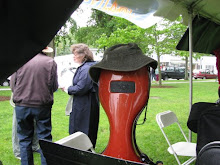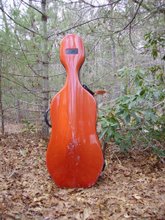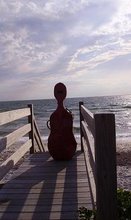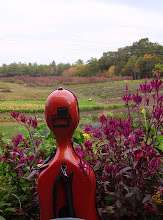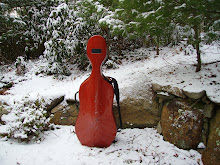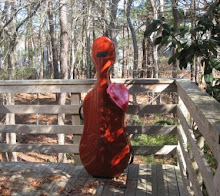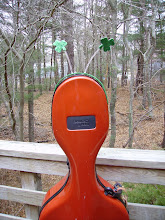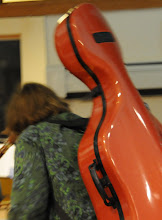Monday, April 30, 2007
Bows and memory
My teacher says a bow cannot improve memory, that I played better with the inexpensive bow because I had just been practicing for an hour and a half, or that, with the loaner bow, I wasn't putting 90 percent of my energies into listening, but rather reserving some of my energies for memory. Could be. But I plan to buy the loaner and use as a backup bow. It has a nice loud, resonant sound. The more expensive bow is capable of a clearer tone, but I think the loaner bow will be great for fiddling: loud is good, in a sea of fiddles and banjos, and inexpensive is good, when you are playing outside.
I am going to keep trying out bows. I liked one of the three, but am not ready to make a decision yet.
Friday, April 27, 2007
Memory
When I started the cello, with a teacher who requires that all pieces be memorized and performed, I initially complained: "I want to play ensemble music, not perform publicly." But I had no choice. I actually started enjoying the memory work, and in fiddling, I am learning to play by ear. I do love being able to play both classical and fiddle music without sheet music.
But lately, I am having trouble memorizing, getting every bow right, etc., especially for the classical music. I don't think it is senility quite yet, but I am feeling that my brain has a limited capacity for holding pieces, whereas before I imagined that each new memorized piece would increase my capacity to learn more. Perhaps it is just that as the pieces get more complicated, you have to think about them a different way to memorize them. Not just Frosty the Snowman anymore.
Well, the fiddle tunes are easy enough at first glance and there are fewer bowing issues, but it gets more complicated playing them in a group, where people are usually playing at a faster pace than I am comfortable with, and everyone is playing a slightly different version of the tune.
That's my challenge for the moment, remembering how to memorize, and getting better at it. Playing the pieces better is closely connected to this, of course, but that is another issue, or group of issues!
Thursday, April 26, 2007
Science and Bach

My daughter and I went to the Boston Science Museum today to see the Darwin exhibit (finally getting to it on the next to the last day of the exhibit here). First, though, we saw the live butterfly garden, a warm and soothing quiet place with an abundance of butterflies. This huge moth has no mouth and dies within five days of becoming a moth, living only to reproduce. Other species live about a week, eating only sugary nectar. There is a lesson there somewhere.
The Darwin exhibit was excellent, except the live Galapagos tortoises and the iguana did not look so happy to be a part of it.
The short film on Darwin's life and thought included some familiar background music: the prelude to the first Bach cello suite, played, it seemed, in celebration of Darwin's decision to publicize his theory of natural selection.
Tuesday, April 24, 2007
Cello bow trial thoughts
Today, my cello teacher (also store manager, so this was kind of a unique sort of cello bow trial) selected several bows for me, more expensive than the shop bows I usually experiment with. I began to feel the differences in balance, weight, sound quality from behind and in front of the cello, and articulation. She gave me a very expensive bow to try, and I suddenly felt the bow as an extension of my arm, with control over the full length of the bow. Great bow! I am not going to buy that one, but it gave me a better understanding of what to look for in the less expensive bows.
Great fun, this trying out instruments and bows! I do believe my cello playing has already improved.
Monday, April 23, 2007
Fretwork, crafts, and music
In this case, the solution offered to the problem of idle hands is fretwork, "the art of cutting open ornamental designs into wood with a scroll saw."
If our young people would only give more of their leisure hours to pleasant useful recreations at home, in any form, there would be far less inclination on the boys' part to fritter it away, as is so often done by them, in frivolous sport, and too often in sinful ways. If every father gave encouragement to his sons to spend their leisure hours in amateur mechanics and afforded to them the necessary tools and space in the house to do such work in, without considering it a bore to his comfort or a nuisance in the house, there would be far less erring souls in the world.The Chronicle mentions that scroll saws (hand tools and foot pedal-powered tools) were popular with the ladies too, an activity that all members of the family could enjoy.
In my pre-cello days, I was consumed with arts and crafts. I wanted to buy a scroll saw, though I cannot recall for certain just what I wanted to make with it, probably something for the kids, jigsaw puzzles, or something like that. The cost and size of electric scroll saws intimidated me, and I never bought one. It's just as well: I still have great quantities of drawing and painting, arts and crafts, and sewing/knitting/needle arts supplies. I joked when I took up music, that it wasn't as messy as arts and crafts. But, of course it is, in its own way. I have tons of sheet music and a collection of instruments, not to mention, rosins, tuners, rock stops, mutes, etc. And I am on the verge of using those old the art supplies again.
Sunday, April 22, 2007
Trying to find time to practice....
 We went to Rhode Island on Saturday to see our son, who lives near this p
We went to Rhode Island on Saturday to see our son, who lives near this p icturesque beach. The weather was wonderful, but the traffic in the Newport area was hectic.
icturesque beach. The weather was wonderful, but the traffic in the Newport area was hectic.Revitalized by the trip nevertheless, I had a good 2-3 hour practice (Suzuki, cello choir, fiddle music) last night.
Today, we did more outdoor exploring in a nearby park, and I spent most of the rest of day and evening cleaning my office. It is very cluttered, as I have not given it a thorough cleaning in a while. I skipped the Sunday fiddle session. I always skip the Sunday fiddle session, as it is hard for me to find time on Sunday. Earlier in the day, I thought, well, better for me to spend the time practicing. But I haven't done it yet. But my lesson is tomorrow morning, so I will see if I can practice for 20 minutes or so. Better than nothing.
Friday, April 20, 2007
42 Percent?
Gallup Organization Reveals Survey Results, which also quotes that figure, and says 20 percent of those 50 and older play an instrument.
On the other hand, Jamming with the Mamas and Papas says that 42 percent of the people who play musical instruments are between the ages of 35 and 50, which is an entirely different statistic!
Though all in my family and most of my friends play an instrument, I know this is a very select group. Still, I think Blair Tindall's figure, in her recent Los Angeles Times article, that 1.8 percent of Americans play an instrument in their leisure time seems much too low.
Maybe it depends on how you define "play an instrument." For years I played the flute only at Christmastime. I'm not sure that counts as much as a daily involvement in music.
Maybe it depends how you define "play an instrument in their leisure time." Maybe she is not counting any professional musician, or those who occasionally gig, or those of us amateurs who consider the cello one of our primary occupations, not something we do in our "leisure time."
I'd like to see some more definitive research. If you know of any good sources, please let me know!
Thursday, April 19, 2007
Good Day, Sunshine!
 The sun has finally emerged after what seems like weeks of rain and dreariness. As my son used to say when he was little: "April showers bring me flowers."
The sun has finally emerged after what seems like weeks of rain and dreariness. As my son used to say when he was little: "April showers bring me flowers."Eventually, the flowers will come, and the leaves. For now, this is the view from my house.
I hosted a fiddle session tonight at the shop, and feel I am making a little progress. The combination of actually practicing the fiddle tunes and attending more fiddle sessions seems to be working. It is always helpful for me to have a fiddle newbie present, as we did tonight, so that we can slow down at least some of the tunes and occasionally use sheet music "for the new person."
Wednesday, April 18, 2007
Cello Choir, Tuesday
Carol, a talented artist, craftsperson, and cellist, brought hand-crocheted "scrubbies" for all, to be used to clean cello strings. She had also created a beautiful collage of photographs of a recent recital, for the teacher. The teacher gave us all cello mutes for a piece we are playing (Farewell to Nova Scotia). I grabbed some String Magazine reprints of articles on adult amateur string players from the lobby of the Conservatory and distributed those. (Several articles: how to find a teacher, ensemble class, playing in a community orchestra, and building self-confidence, all from the May 2007 issue of Strings Magazine. Strings has an online forum, and one of the articles encourages readers to share their experiences as adult beginners at the online String Talk forum. I had a little trouble registering--no place to indicate a password. Later, though, I got a password via e-mail. I haven't had time to check back to see if there has been any activity on this topic.)
Then, we got some new music, mostly very playable, with some challenging spots for interest: Jesu, Joy of Man's Desiring by Bach, and La Diva deL'empire March by Satie. Both fun to play.
Tuesday, April 17, 2007
Stumbling into the future
It took me all of this three-day weekend, with several trips to the store for various cables and such, before finally deciding that my computers are too old to deal with this new technology. So, I finally went out and bought a new computer today, all Vista-fied. Even this was complicated, as the store offered a service to set up virus and spyware programs and remove "craplets," those "trial programs" that new computers are littered with. So I said fine, having a read an article about the difficulties of removing these unwanted programs. I went home empty-handed, but was able to return before the end of the day to pick up my computer (each trip taking 3 hours, as I do not live very close to a computer store).
But this is lots more fun. I feel wimpy for paying the computer store to clean up my computer, but am so tired of fussing with computers and connections and am anxious to actually use this machine.
We had a long power outage this morning, and I spent some time re-reading Kurt Vonnegut (I was a big fan of his in the 70s, but the Vonnegut books on my shelf date from my son's recent interest in him). "Welcome to the Monkey House" is a short story written in 1968 about birth control in the overpopulated moralistic world of the future (more interesting than that) which, interestingly, does not envision any advances in communication technologies. People send telegrams and letters. The story takes place on Cape Cod, and references all the Kennedy's who have served as president. Interesting, re-rereading this stuff almost 40 years later.
No practicing today--too much computer stuff and driving.
Saturday, April 14, 2007
Cello-fiddling frenzy

 The fiddle performance went well, more or less. I forgot to bring a chair and did end up standing, which was more or less fine, but hard on the wrist, and harder to shift well.
The fiddle performance went well, more or less. I forgot to bring a chair and did end up standing, which was more or less fine, but hard on the wrist, and harder to shift well.We played for about an hour, the weather was great, and the crowds were smiling. Many more people smiled at me and my cello than had previously smiled at me and my fiddle, making me feel like I should play a spectacular solo. Maybe next time.
At the moment, I only know a few tunes. I really need to memorize more tunes and memorize at least some accompaniments to tunes, so I am not always guessing. But it was fun, and gives me the inspiration to practice these fiddle tunes and work on accompaniments more, a lot more.
Friday, April 13, 2007
Recital, Workshop, and Concert with Eugene Friesen
Eugene Friesen, a friend of my teacher's, came for his annual visit to our group class, which included 22 students, mostly kids, ranging in age from about 5 to high school age. I was one of 3 adult students who attended. We were arranged in a circle in an old and picturesque community center on the waterfront. Our little recital went fine: 4 tunes from Suzuki Book 1, and a group piece by the high school girls. I always enjoy playing with large groups of celli.
Eugene is a wonderful contemporary cellist who also teaches at Berklee School of Music in Boston. He plays all genres of music and encourages students to experiment, to improvise, to find music that is their own. He taught us a few techniques for improvising using pentatonic scales. For instance, using pentatonic A minor: one student, or the class, plays a pizzicato accompaniment: With right hand, pizz open C, with left hand pizz open A, then open G with right hand, followed by open D with left hand. Another student improvises, using only the notes in the A minor pentatonic scale: A, C, D, E, G. Very easy, and it sounds great, encouraging one to think that improvisation is indeed possible.
After the workshop, Eugene performed in a recently restored historic mansion (now arts center). His theme was similar, that the cello is a wonderful instrument and can be used to play all genres of music. He played Bach, fiddle music, blues, whale sounds, rock, and one-person jazz band. He played in a squirrel mask and in a Pablo Casals mask, impersonating each believably.
I learned a couple of things relevant for my fiddling group performances: many types of accompaniment are appropriate, it is ok to improvise on limited musical theory knowledge, and it is possible to play standing up. Eugene played standing for much of our workshop. At the concert, he took out a long canvas strap, and belted his cello to his waist, saying, to the many kids present, "Never do this." He put a rattle-type noisemaker on one foot, a tambourine around his neck, and a stovepipe hat, which turned out to house a cymbal, on his head. He hit the cymbol and the tambourine with his bow, stamped his foot to produce a rattle sound, and played the rollicking jazz on the cello strapped to his waist. Very amusing.
One of the fiddlers in my group was there and I joked about strapping my cello to my waist. He thought it might be better for us all to wear the cymbal hats. I can imagine, everyone wearing a cymbal hat, the bows flying, except perhaps for the expensive ones, as people hit the hats of their fellow fiddlers, in time to the fiddle tunes.
Thursday, April 12, 2007
Fiddling on Saturday
"Sure," I said, "Can I play the cello?" (I have always played fiddle at performances.)
"I don't know," he said, "Can you play the cello?" (I am hoping he was making a joke.)
"Better than the fiddle," I said.
"Sure," he said, "it looks great--I can't hear you, but it looks great." (I was sitting next to him at the last session! But at least I know my cello playing is not disruptive, and I am pleased to think what I am doing looks great. Among the things I worry about is whether I "look like a cellist." I do think others heard me, as they commented on my playing, esp. Ashokan Farewell, which sounds great on the cello.)
"Besides," he added, "I need all the people I can get for this event."
"OK, I'll be there."
"Dress warmly," he said, "and bring a chair."
This is one disadvantage of playing the cello in a fiddle group: being seated. The fiddlers stand while playing, and they move around easily, occasionally leaning in to sing. They often play outside, with no stage, as they will on Saturday. Maybe I can find a movable stool, or learn to play the cello standing up, like Rushad Eggleston.
Obviously, this requires some adjustment to my goal to learn to play lots of tunes and musically appropriate accompaniment by June 9. My planned two months of preparation time is now only two days. On the other hand, it is only a 30-minute performance, and I think I can look and even sound like a cellist for 30 minutes.
Our participation in the event is canceled, by the way, if it rains. It's about climate, not about weather.
Wednesday, April 11, 2007
Away from the computer

I found this cartoon at http://www.weblogcartoons.com/. It expresses my feelings well this week, so the last few days I've been working away from the computer or at least connecting to the Internet as infrequently as possible.
I find I am practicing more, on multiple instruments, as an alternate work-avoidance technique.
Tuesday, April 10, 2007
Just practicing
I did manage to find a couple of hours to practice and am happy to report that I worked on some fiddle tunes, including treble clef reading, and I do believe it is getting easier.
Monday, April 9, 2007
Fiddling goals
I recently switched to cello in the fiddle group. As the only cellist, I add something more to the group than being the worst violinist. I have learned a handful of tunes on the cello, but it is even harder to play them fast enough on the cello. I bought several books on playing cello accompaniment for fiddle, but have really not had time to study them.
My strategy at the moment is to play the tunes I know, when they come around (at Friday night's session, the ones I knew on cello were Angelina Baker, Mari's Wedding, and Ashokan Farewell), and just play "notes that sound good" (hopefully in the proper key), until I can learn proper accompaniment methods. I play pizzicato for variety, and when I am really not sure what I am doing. The other players are wonderfully supportive.
The group includes fiddle, mandolin, guitar, tin whistle, dobro, washtub bass, bodhran, and, of course, cello. The bass player and I talked. He is self-taught, and also trying to figure out how to accompany, so my plunge-right-in method is not crazy, or at least not unique.
I love the idea of fiddling, the spontaneity, the lack of sheet music, the shared common knowledge of the music. I also like that the fiddlers perform frequently. I love performing (why, I don't know, as I am not the world's greatest musician), especially outside, and the fiddlers have numerous outdoor performances planned for the summer. Sometimes I play the concerts with them, but more often not. I decided to join them for a bluegrass festival on June 9. That gives me two months to learn a few more tunes and get a better handle on the theory of accompaniment and try to hear chord changes.
So, my cello fiddling goals for the next 2 months:
- Go to at least 2 fiddle sessions a month (I have been attending only one).
- Practice fiddle tunes as part of regular practice (not just the day before fiddle session).
- Practice reading from treble clef and transposing an octave down mentally, to avoid having to transpose tunes on paper, just to memorize them. I can read treble clef because I play the flute, but I have to really concentrate in order read treble clef while playing cello an octave lower. I want the low sound, not the thumb position sound.
- Study the cello fiddle accompaniment books that I have (the best one, I think, is by Renata Bratt).
- Learn a few more tunes in Abby Newton's book, Crossing to Scotland, even if they are not in the fiddlers' current repertoire. I love this book, and the group is usually happy to learn new tunes.
Thursday, April 5, 2007
Signs of Spring

It has been cold and close to snowy, but spring is persistent.
Actually the real proof of spring here is the reopening of the clam shacks and ice cream shops. And that is finally happening too!
I am looking forward to the outdoor concert season, still a month or two away, but we are practicing for it.
Wednesday, April 4, 2007
Cello choir
Unfortunately we played a new piece in which all parts but the first play very softly. I am playing part 4, with another woman, so had to play extra quiet. A little disappointing!
(Though, it is also good to be able to play softly, with expression.)
Tuesday, April 3, 2007
Group Recital Next Week
My teacher rarely has group recitals, but we are having one next week, in honor of a visit by contemporary cellist Eugene Friesent. It will be mostly kids; maybe 4 adults. I am the most “advanced” of the adults who will be there, but some of the kids are more advanced and/or have been playing longer. We are playing several pieces from Suzuki Book 1 from memory, in unison; Four high school girls will play the Telemann quartet that I am currently rehearsing with my cello choir, which is directed by another teacher. It will be interesting to hear the kids play it! There are no solo pieces and not too much to worry about.
I do kind of wish we would do more formal recitals, just so I can hear the others play, but my teacher focuses on individual Suzuki book recitals in which one plays every piece in the book by memory, with piano accompaniment. I add ensemble pieces to my recitals, initially because I needed an audience, and couldn’t imagine anyone sitting through a book one recital unless they also got to play. Now that the pieces are more complicated, it would be easier to have a group recital, in which each student would play only one solo piece, at least as practice for a book recital. I have been to recitals of the teacher of my cello choir, and it is inspiring to see how students improve over time.
Our recital next week will be quite short and is actually only the warm-up for the main event, which will be a workshop with
Monday, April 2, 2007
A Sympathy Vote for Sanjaya
100,000 people auditioned for American Idol this year. If “talent-free” Sanjaya made it to the finals, is it not the fault of the selection process, not the adoring ‘tweens and mocking Vote-for-the-Worst folks?
American Idol trades on the pitch-challenged and the quirky, the oddly garbed, the clueless, the mildly talented looking for the express route to stardom.
Sometimes I think American Idol would better if it were a serious music competition, if the judges treated an audition like a master class. Imagine Simon giving real advice instead of going for the "humorous" insult. One of the tone-deaf auditioners suggested that the show follow initially bad, but promising, singers, thr0ugh a singing make-over process, showing how they improve over time. That would be more humane, but maybe not as provocative.
Still, the show gives the impression that musical talent is something you have or you don't, not something you can cultivate. And it sends an all-or-nothing message, thumbing its nose at Broadway, cabaret, and wedding singers, not to mention those who sing for pleasure.
I’ve been kind of impatient with American Idol this year (yet it is one of the few shows I watch). I was irritated with the nastiness of the judge's comments this year, especially when you know that the insulted singers have gone through 3-4 auditions before they reach Simon, Paula, and Randy, falsely encouraged at each step along the way.
I find Sanjaya and the recently deleted Chris Sligh amusing because they are different. If I were the sort to vote for American Idol contestants, I might actually vote for Sanjaya. Well, maybe not. But it is fun to watch him. I actually thought his singing had improved last week. The ponytail mohawk was hilarious; and even funnier was Ryan Seacrest's copycat hairstyle the next night.
I do have some experience with American Idol auditions—I accompanied my then-16-yr-old daughter on a rainy two-day audition at Gillette Stadium (Boston) last year (Season Five). My daughter has a glorious voice, more operatic than pop, but, I figured she was a shoe-in. She had just been elected president of the high school choir; and I had been elected to (agreed to take) the position of president of the parent support group for the choir. We were planning and fundraising for a choir trip to
Not to worry. She didn’t pass even the first audition. More about that another time.
Sunday, April 1, 2007
Iran, with cellos
His message is this: Iran is a beautiful country full of "cordial, generous, and smart" people, though as in any country, some not so kind in spirit. Let's respect this country and not respond to this current crisis by bombing the life out of yet another nation.
The slide show shows a beautiful and cultured country. Sure, it's biased--women are presented in an ideal light, and there are no photos of poverty, political and religious persecution, or people held hostage.
But it puts a human face on this "axis of evil," and is worth taking a look at.
And, yes, there are cellos!
